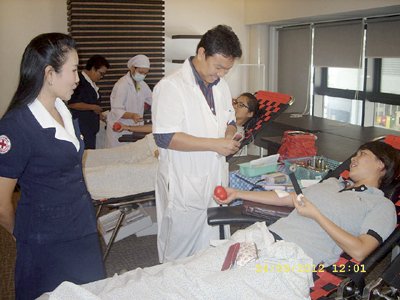Phuket Business: The tree that bears fruit

PHUKET: At the helm of Anuphas Vividhkarn Co Ltd’s CSR program is Montavee “Tommy” Hongsyok. The 35-year-old Assistant Managing Director of Phuket’s exclusive Honda dealership follows in the footsteps of his father, Montri Hongsyok, an accomplished executive and respected community figure in Phuket.
Following is a Q&A session that the Phuket Gazette recently had with Tommy about the Honda dealer’s corporate social responsibility (CSR) program.
Phuket Gazette: What is your philosophy on CSR ?
Montavee Hongsyok: In my view, CSR is a form of integrated management; a necessary commitment that companies make to promote and develop their organization to be able to respond to economic, social and environmental issues, for the betterment of society.
In implementing CSR initiatives, whether inside or outside of the organization, you have to carefully consider the impacts and be prepared to adjust and adapt the program so that the optimal benefit is realized in the community. A good CSR program is like a fruiting tree. You start off with a seed – the initiative – and plant it in the soil – the community. With regular sunlight, water and nutrients, that seed can grow into a plant.
With good care and attention, the plant becomes a tree that can branch out into the community, yielding its good fruit for everyone to enjoy and benefit from. However, CSR is not just a one way street – we don’t just do it to the community, but rather, together with the community.
Can you give an overview of your CSR program?
We’ve been conducting CSR activities for quite some time. Previously, we didn’t put much effort in formally publicizing our initiatives. Lately, we’ve noticed more and more new business ventures and start-up companies forming in Phuket, and feel that it’s time to formally set a positive benchmark for the new business generation to strive towards.
Our program includes a number of community based activities, organized in collaboration with the public sector and state agencies. Programs under our mother company, Honda Automobile (Thailand) Company Limited, include “Honda Green Way”, a campaign aimed at increasing green spaces and promoting eco-friendly cars and driving, as to address global warming and preserve the environment; Other initiatives include the “Honorary Tree Planting Project”, as well as the collaborative establishment of the “Honda Foundation” under the slogan “Together for Tomorrow”.
Implementing these initiatives has helped to raise awareness among our administrators and personnel. In addition to the programs through Honda, we also carry out a number of our own initiatives.
For example, we collaborate with the Phuket Regional Blood Center in holding blood drives every three months. The most recent initiative includes, in collaboration with K-SME reps in Phuket, a charity drive to donate necessities to the SOS Foundation’s Children Village.
Another program worth mentioning is our waste and sustainable garbage disposal project, which is designed to teach our employees as well as people in the local community how to separate and dispose their waste properly.
What are some of the important values that you’ve learned and apply?
I’ve learned a lot from my dad. He has given so much to his employees and all the people around him. He leads with sincerity and compassion, while not seeking monetary return. This has inspired me to do good things and give back to the people around me, likewise. By creating CSR initiatives with all one’s heart and ability, I can weave the good things of life into a quilt for the next generation.
The more you give, the more you receive; CSR activities bring returns that are more important than profit. These are satisfaction, a sense of sufficiency, fulfillment, merriment and love.
How do you measure the effectiveness of your CSR initiatives?
Feedback from our target groups, which includes our employees, customers and the local community at large, helps us know if what we are doing is working and worthwhile. Other than the satisfaction expressed directly to us, we can also look at data, such as CSI – the Customer Satisfaction Index.
It is important to understand that money is not, and should not be a basis for determining how successful a CSR program is. CSR is not like a business investment where you can expect an immediate, quantifiable return.
The returns in CSR are the fruits of that tree – they require time and care to develop and materialize into benefits that can be fully realized in the community. A key goal of CSR is for the values to be instilled in and by the people. You can’t force someone to care and make a difference. They have to want to and do it on their own account.
What is your CSR budget?
This is not absolute. We try to keep our CSR budget flexible and open, based on the needs and merit for each of our programs. Another thing to consider is that many of our CSR initiatives and goals overlap with other programs in the organization, including our ISO certification, employee training and team building, as well as customer experience management (CEM).
— Steven Layne
Latest Thailand News
Follow The Thaiger on Google News:


























